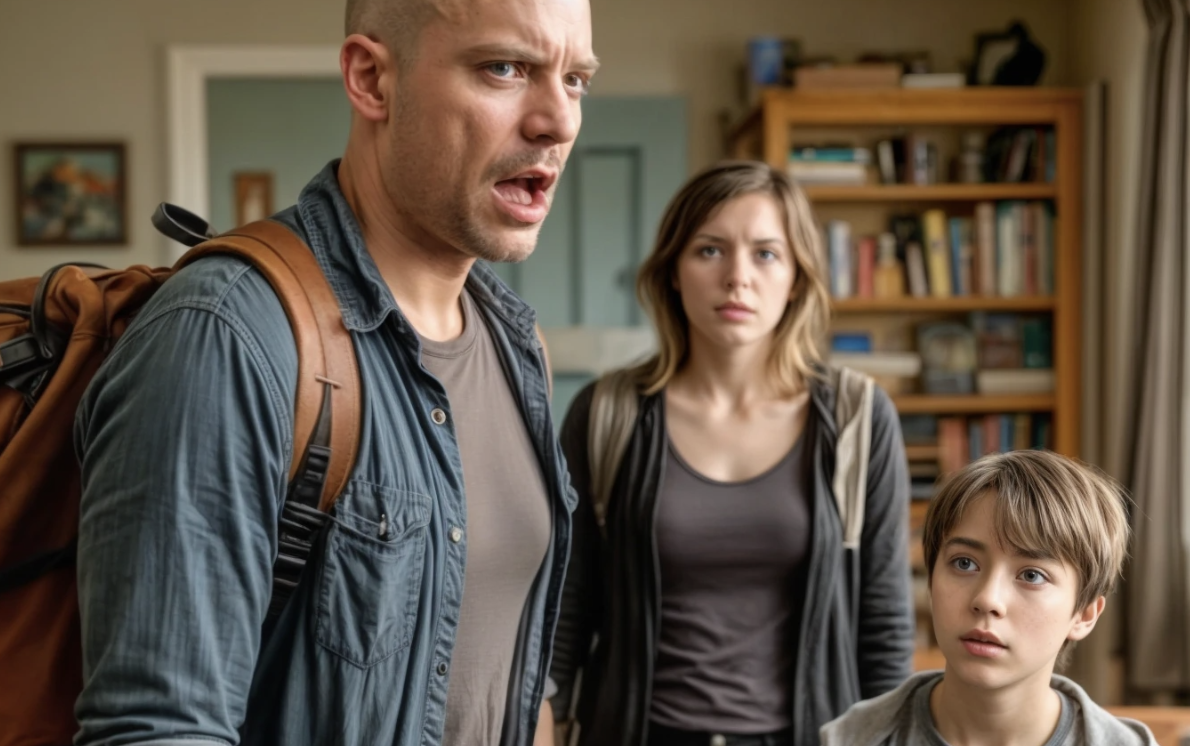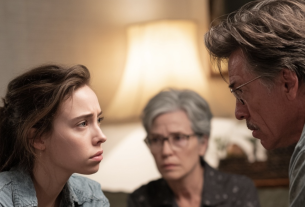Vera Ivanova, hunched over, walked out of the courthouse—as if her soul had stayed behind on the cold benches among dry words and indifferent glances. She looked like a shadow of herself, as if she had been crossed out of life like an unnecessary word from a text. Her gray coat, crumpled and carelessly thrown over her shoulders, almost slipped down as if it too refused to serve its owner. Her hair, once neatly styled, was now tangled and fell heavily over her forehead like a dark cloud. Her hands dropped limply, but one—a thin, pale one—tightly grasped her son’s small palm, as if only in this touch was there a connection to reality.
“Mom…” Lev whispered, hiding his face from strangers’ eyes, as if he knew his mother was unable to protect them both now.
Vera could not raise her eyes. That was it. The end. What had been was gone, as if it had never existed. Mark did this. He destroyed their family, took almost everything, slandered her, painted her as a traitor, even convinced their son that she was to blame for everything. Bitterness rose in her throat, pain clenched into a lump, her breath caught. Her memory betrayed her with that scene: three months ago, the kitchen, a strange woman, the sharp scent of her perfume—too strong, too expensive—and Mark’s laughter—just as before, but no longer for her. She remembered how he said then, as if talking about the weather:
“Don’t you dare make a scandal. It’s not in your interest.”
Now, in the noise and bustle of the district court hallway, people scurried around her. Someone chewed gum, someone searched for a lost folder in a briefcase. No one saw her pain, no one knew that inside her there was emptiness. Everyone was busy with themselves, their own affairs, their own lives. And her life had just collapsed like a house of cards. She squeezed her son’s hand—the only point of support in this world. She just had to survive. Everything else would come later.
At the entrance of the house where they once lived, Vera froze in hesitation for the first time in years. On the concrete porch lay their belongings—pitiful piles: a suitcase with a worn green stripe, a bag with toys, a box labeled “Documents.” Everything was covered in dust; the light rain blurred dark stains on the bag. Lev pressed into her shoulder:
“Mom, are we going home?”
Vera wiped his nose with the corner of her scarf, tried to smile though her lips trembled:
“Home is now wherever we are together.”
She lifted the box, put the heavy suitcase on wheels. Behind the apartment door remained the old life—closed forever like a theater curtain after the last act.
Vera called her friend Polina. She opened the door in a robe; the apartment smelled cozy of coffee and vanilla. Polina hugged Vera tightly, as before, and quietly held Lev close:
“Stay with me for now. Rest a little.”
Polina’s children were already asleep. At dinner, her friend caught Vera’s gaze several times—and each time looked away. Awkwardness hung in the air. A pause hung over the pot of macaroni, heavy and prickly.
“Forgive me…” Polina finally said. “Mark… he talked to me too. He… hinted that you had something… problems with the law, bad substances. Told me to watch out.”
Vera felt her breath falter. Even here, in this house where they used to laugh, where joint photos hung on the walls, she felt like a stranger. Lev attacked the food as if afraid they’d soon chase him away.
A few days later, Polina approached in the evening with a worried face:
“Sorry, I… I’m scared for my children. Mark has told everyone. You know, they even slipped me your ‘medical records.’”
“What medical records?”
“That you supposedly have a socially dangerous disease and harmful habits. I know it’s lies, but how do I shut their mouths? Even the children’s teacher asked me about you.”
The warm home turned into a cage. Vera was packing again in haste; noise filled her head, her heart tightened. Lev sobbed confusedly:
“I want my teddy bear. Why didn’t dad let me take my teddy bear?”
“Daddy has other things to worry about now, sweetheart,” Vera gently stroked him.
That night they spent at a bus stop lit by an orange streetlight. Road dust, worn grass underfoot. Lev slept, his head on his mother’s lap. Vera stared into the dark sky, where not a single star shone.
She made a decision:
“Let’s go, Levushka, to the dacha. Remember our house in the village? The one where we ate raspberries in winter.”
The night seemed endless, like the road ahead—only a vague hope and an old house on the edge of forgotten paths.
The dacha village greeted them with dust, rain, and forgotten time. The nettle-overgrown fence leaned sideways—as if waiting with tired sadness for the return of its owners. An apple tree behind the house shed yellow-red leaves, and the path looked like no one had ever stepped on it.
Vera raised her collar and inhaled the air: the smell of musty grass, stove smoke—a strange, slightly sharp feeling of comfort.
“Mom, are we staying here long?” Lev asked, stomping on the wet doorstep.
“As long as it takes, buddy. We’ll have to clean up.”
At first, they washed the windows: Lev drew funny faces with soapy stains on the glass, and Vera laughed, realizing for the first time in a long while that she wasn’t crying.
“Will you help me with the path?” she offered her son. Lev happily brought an old dustpan, and together they cleared the path of fallen branches and last year’s leaves.
When exhaustion became unbearable, Vera put her son to bed in an old bed. In the dim chandelier light, the room seemed almost cozy. Lev cuddled up to his mother:
“Mom, are we never going back to dad?”
Vera hugged him tightly, suppressing a tremor:
“We’re on our own now, Lev. Everything will be fine.”
Late at night, when Lev was asleep, Vera opened her laptop. Her fingers hovered over the keyboard for a long time—she wanted to disappear, to stop being this Vera Ivanova.
Still, she typed a short letter:
“Semyon Vasilievich, good evening. I am forced to leave the city for a while due to personal circumstances. Is it possible to work remotely?”
The reply came in the morning.
“Vera,” said her boss in a steady voice. “I’m aware of the main situation. Let’s try to transfer you to remote work. The main thing is not to fall apart and not start taking… well, you understand… Two months, and then we’ll see. Don’t worry, we’re behind you.”
Vera felt a point of support. Small, but real.
Day by day Vera gathered documents, sifted through letters, searched her memory for what else might be needed for the second hearing. At night, when Lev fell asleep, she quietly cried, thinking how not to break. Sometimes Lev came up with a cup of tea or a strange clay craft:
“Don’t be sad, mom.”
One night, a letter arrived: a summons to court in a week. Vera barely gathered strength not to scream.
The second hearing was even harder than the first. Into the stuffy hall burst Mark—exhausted but aggressive. From the threshold, he began raising his voice, throwing around many folders.
“Listen, Your Honor,” he spoke loudly. “She systematically deceived me, hid income. I could tell much more!”
Vera was silent, staring at the wall. The judge—a man about fifty with tired eyes—raised his eyebrows:
“Do you have more evidence, Mark Valeryevich?”
Mark waved papers, dropping several sheets. His lawyer snorted.
Vera tried to speak, but the judge sharply interrupted:
“You will be given the floor later.”
The pause dragged on painfully long. It seemed the participants breathed only to prepare their next remarks.
In the end, the judge read the decision with a hoarse voice:
“Ivanova is awarded exactly half of the dacha house, address known to you. You have no other claims.”
Mark put his hands in his pockets and left the hall. On the stairs, he suddenly snapped:
“I’ll rent you some neighbor, got it?”
Vera straightened up, looking him straight in the eyes. Words seeped from inside with chilling calm:
“I’m glad it’s all over.”
But inside she felt empty, like a shell. Her head buzzed; strength left with every step. It seemed she had won—and yet lost everything.
An invisible and painful monologue broke out: “Why did everyone think I was the only one to blame? As if I destroyed our life—what about him? His lies, other women, rumors—they all shoved it on me.”
She returned again to the empty house, each time trying not to cry in front of Lev. She lived as if at the bottom. She called these days: the second bottom.
Three days of calm, three days filled with anxious waiting—and then, on the quietest evening, when dusk began and the air grew cooler, Vera heard a dull but clear knock at the door. She froze, feeling her heart tighten. On the porch stood a man—tall, angular, as if stepped out from the shadow of the past. His worn jacket looked like a second skin, and stubble on his face gave him the look of a man life never gave soft pillows to. On his wrist, barely visible through the wear, were tattoos—not bright, not flashy, but more like reminders.
On his face—no hint of a smile, no shadow of a threat. Only calm. He set his bag on the ground and said dryly but clearly:
“Good evening. I rented half of the house from your ex.”
Vera involuntarily took a step back, instinctively pulling Lev’s shoulder closer. Inside everything tightened with uncertainty.
“I… I understand. But I have a child. I hope you don’t mind.”
The man nodded shortly:
“Artyom Pavlovich. I won’t interfere.”
And without adding another word, he went into his half of the house. The door slammed. The phone rang somewhere inside. Vera stood, not knowing what to feel—fear, anxiety, or just numbness.
That night she spent without closing her eyes. Checked every door, every window, as if the house could have hundreds of unseen cracks through which danger might enter. She held Lev in her arms, listened to every rustle behind the wall, every wind shaking branches under the window. She was afraid. Afraid of the unknown. Afraid that the past would catch up with them again, like then—in court, in the entrance, in Polina’s apartment.
The next two days Artyom barely appeared. He was a shadow living behind the wall but not invading their life. But one day, when Vera went into the yard to gather fallen branches after the night rain, she was stunned by children’s laughter. Lev, cheeks flushed, played ball with neighborhood children. And among them—Artyom. He deftly returned the hits, moved easily, as if he had forgotten the heavy stone he once carried on his shoulders. He laughed. And this sight stunned Vera.
She slowly approached the porch where Artyom, noticing her, sat on the steps and asked almost gently:
“Not scared? I don’t attack other people’s children. On the contrary—I help, if needed.”
Then he spoke—not about himself, not about the past, but about life, about how important it is to be nearby when someone needs you close. He said that long ago he’d been in prison. Didn’t hide it. He got in for a fight—not for hooliganism, but because he defended his ex-wife. He said it simply, without excuses or pride. Just a fact.
Vera was sincerely surprised. There was no malice in him, no drunken brazenness, no emptiness that so often haunted her lately. Only calm. Confidence. Maturity.
“Thank you for your honesty,” she smiled for the first time in a long while. “I’ll try not to bother you, but… if I get scared—I’ll say right away.”
Artyom nodded—softly, almost tenderly.
“Everything will be fine. Let’s live like humans.”
That night Vera slept more peacefully than in recent months. For the first time since the court, the flight, the destruction—she felt she was not alone.
With the coming of spring, the air smelled of renewal. The snow melted, the earth woke up, the trees began to stir. One day Artyom suggested:
“Want me to help clean the garden?”
Vera hesitated at first but an hour later the yard was full of life. Artyom skillfully wielded a shovel; Lev ran around, diligently carrying branches, raking leaves, bragging about his “help.” Then Artyom taught Lev how to hammer nails:
“Look, like this—don’t hit your fingers.”
Vera stood by the window, watching them, and for the first time saw in Artyom not a dangerous neighbor but a real person. A person who doesn’t run from the past but builds the present. A person who can be near when needed.
In the evening, she shyly invited him to the table:
“Maybe you’ll eat with us?”
The words were hard to say—she feared being too open. But Artyom, a bit embarrassed, agreed. He washed up in the yard, tidied himself up. He was a bit over forty, but his eyes held the wisdom only lived experience gives.
At the table Lev quickly got comfortable, bragged about his crafts, showed drawings, talked about school. Artyom thanked for the food, awkwardly adjusted his sleeves but listened carefully, respectfully. He spoke about his plans—that he took some materials to build a gazebo. And Vera suddenly understood: he wanted to be part of this house. Not just live, but participate.
Soon dinners became routine. Conversations—light. Laughter—frequent. Vera, with anxiety but genuine pleasure, began to look forward to each meeting. The world that had seemed destroyed was taking shape again.
Time passed. The garden became cleaner; first flowers sprouted in flowerbeds. Every morning Vera heard Artyom and Lev repairing something, discussing new books, or just laughing while playing ball. By evening they brewed tea, went out to the veranda, watched sunsets, as if living each day together like the last and most important.
“I never thought nature was a whole world,” Artyom once confessed, pouring tea into cups.
Vera felt warmth near him—and fear. Fear of making another mistake. Fear of losing everything she had begun to build. But in his eyes was something more than just kindness. It was sincerity. Reliability.
Lev grew fond of the neighbor. Called him “Uncle Artyom,” brought him chocolates, drawings, postcards. When the boy fell asleep, he and Artyom moved from small talk to topics that touched the soul.
One evening Artyom sat on the steps, hugging his knees, silent for a long time. Then he said:
“Vera, you’re a good woman, really. But I have a past that doesn’t forget. I have to leave, not to interfere. You deserve better.”
The words stuck in her throat. Lev was already asleep. The lamp burned softly in the room, gently illuminating their faces, as if emphasizing the importance of the moment.
“You are needed by us, Artyom. No matter what happened. What matters is who you are now,” Vera forced herself to look up. “We decide who our family is.”
Silence lasted long. Only the wind outside the window broke the quiet, as if waiting for an answer.
Artyom gently but firmly took her hand:
“If you really want this—I’ll try to stay.”
She nodded. Something warmed inside. Her heart filled with light.
A year passed.
Vera stepped out of the salon of a new car—not the former broken, abandoned woman but confident, with straight posture, with clear, calm eyes. She entered Mark’s office without hesitation or trembling and threw a black folder on the table.
“What’s this?” he looked displeased.
“Money for your share of the dacha. Now I can afford a lot. I have a family.”
Mark snorted, unbelieving:
“What family?”
Vera smiled—carefree, free, as if for the first time in her life.
“You’ll see soon.”
The next day Mark came to the dacha—the house was unrecognizable. New fence, neat flower beds, fresh smell of paint. On the terrace were Vera, Lev, and Artyom. He, in a simple tank top, drill in hand, and a cheerful smile, was building a new garage.
Mark tried to approach, called out to his son, but Lev, seeing his father, fearfully pressed against Artyom.
Artyom narrowed his eyes slightly, clasped his hands—the look became hard, unfriendly.
“Go away,” he said calmly but firmly.
Mark slowly retreated. He left, leaving behind only the dust of the past.
In the evening Vera put Lev to bed, kissed his forehead, then with a smile placed her hand on her rounded belly. The world she lived in finally became truly safe. A world she created not from ruins but from love.



